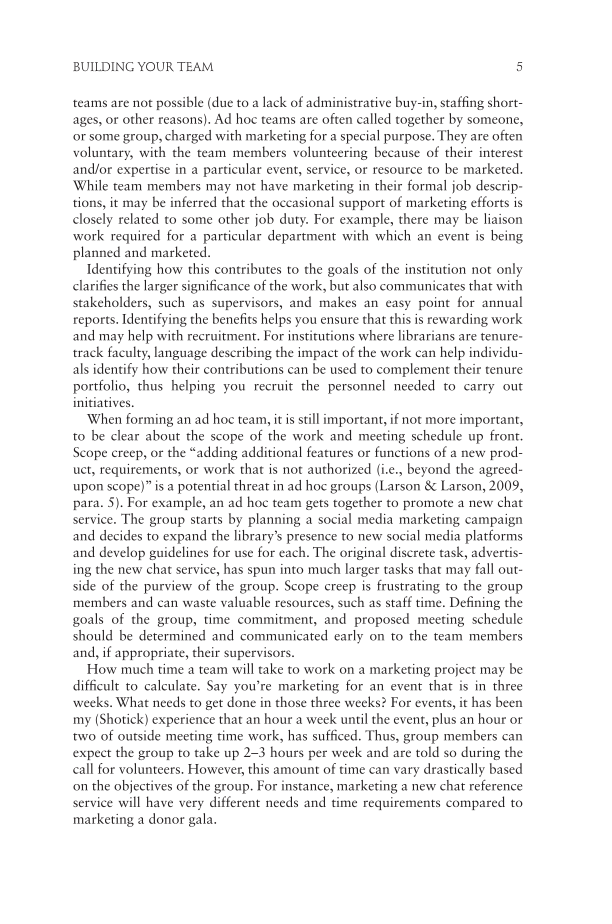Building Your Team 5 teams are not possible (due to a lack of administrative buy-in, staffing short- ages, or other reasons). Ad hoc teams are often called together by someone, or some group, charged with marketing for a special purpose. They are often voluntary, with the team members volunteering because of their interest and/or expertise in a particular event, service, or resource to be marketed. While team members may not have marketing in their formal job descrip- tions, it may be inferred that the occasional support of marketing efforts is closely related to some other job duty. For example, there may be liaison work required for a particular department with which an event is being planned and marketed. Identifying how this contributes to the goals of the institution not only clarifies the larger significance of the work, but also communicates that with stakeholders, such as supervisors, and makes an easy point for annual reports. Identifying the benefits helps you ensure that this is rewarding work and may help with recruitment. For institutions where librarians are tenure- track faculty, language describing the impact of the work can help individu- als identify how their contributions can be used to complement their tenure portfolio, thus helping you recruit the personnel needed to carry out initiatives. When forming an ad hoc team, it is still important, if not more important, to be clear about the scope of the work and meeting schedule up front. Scope creep, or the “adding additional features or functions of a new prod- uct, requirements, or work that is not authorized (i.e., beyond the agreed- upon scope)” is a potential threat in ad hoc groups (Larson & Larson, 2009, para. 5). For example, an ad hoc team gets together to promote a new chat service. The group starts by planning a social media marketing campaign and decides to expand the library’s presence to new social media platforms and develop guidelines for use for each. The original discrete task, advertis- ing the new chat service, has spun into much larger tasks that may fall out- side of the purview of the group. Scope creep is frustrating to the group members and can waste valuable resources, such as staff time. Defining the goals of the group, time commitment, and proposed meeting schedule should be determined and communicated early on to the team members and, if appropriate, their supervisors. How much time a team will take to work on a marketing project may be difficult to calculate. Say you’re marketing for an event that is in three weeks. What needs to get done in those three weeks? For events, it has been my (Shotick) experience that an hour a week until the event, plus an hour or two of outside meeting time work, has sufficed. Thus, group members can expect the group to take up 2–3 hours per week and are told so during the call for volunteers. However, this amount of time can vary drastically based on the objectives of the group. For instance, marketing a new chat reference service will have very different needs and time requirements compared to marketing a donor gala.
Document Details My Account Print multiple pages
Print
You have printed 0 times in the last 24 hours.
Your print count will reset on at .
You may print 0 more time(s) before then.
You may print a maximum of 0 pages at a time.































































































































































